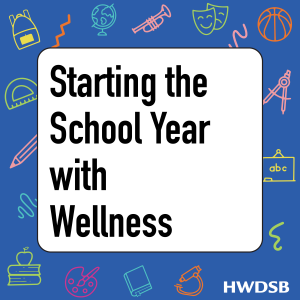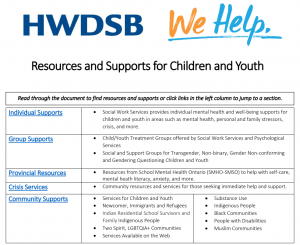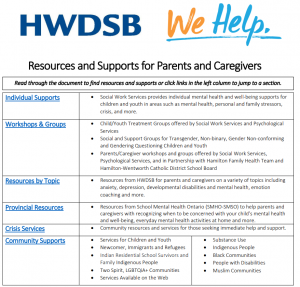
We Help Update – Back to School 2023-24
Back to our Mental Health and Well-being page.
Transitioning Back to School
Back-to-School can be a challenging time for students, staff and families. Students may be nervous or reluctant to return to school, with caregivers worried about their mental wellness.
Here are some tips that can help your child/teen have a positive start to the school year:
- Be kind to yourself – As parents/caregivers, you’ve likely navigated a lot of stressful and draining situations. Take some time to focus on your own mental health and well-being and recognize that you’re doing the best you can.
- Watch for signs of anxiety – Your child may tell you that they feel fearful or overwhelmed, or you might notice things like frequent headaches, trouble sleeping, irritability or emotional outbursts. Your child might seem withdrawn, or overly tired or restless.
- Talk with your child/teen – Talk about what the return to school might be like for your child and what they can expect. Allow them space to express their concerns and help them remember the parts of school that they look forward to the most. Check in with your child/teen regularly, as these feelings may shift and change.
- Calm anxious and worried thoughts – When your child seems anxious or worried, support these feelings with validation and empathy. Suggest stress relief techniques like a power nap, mindfulness practices, visualizing positive places or experiences, deep breathing, listening to music or getting organized. Address concrete worries by walking the route to school together or supporting renewed connections with friends.
- Work towards familiar routines – As summer ends, it may help to gradually move back to a schedule more like the one you use during the school year. This may mean going to bed a bit earlier, getting up earlier or eating at more regular times.
Remember as parents/caregivers you know your child best!
- Community Supports and Mental Health Resources for Students
- Community Supports and Mental Health Resources for Parents and Caregivers
- Mental Health Resources by Topic
Transcend Youth Group
Transcend is a social and support group for transgender, non-binary, gender non-conforming and gender questioning children and youth from HWDSB schools. Group meetings are held once per month for two hours and are facilitated by peer leaders with lived experience. Transcend meetings are a welcoming environment which allows youth to develop social connections with others who share some aspect of their identity, so that they can help and support and learn from each other and from the facilitators.
Please contact [email protected] for more information.
AFFIRM
AFFIRM Is an eight-session Cognitive-Based Therapy informed treatment group specifically for Two Spirit and LGBTQIA+ youth to develop coping skills for anxiety and stress related to experiences of discrimination as a result of their sexual and gender identities. The goals of AFFIRM are to decrease unhelpful thoughts, feel better about yourself and lives, and to make healthy choices for sexual and mental health.
Register online at projectyouthaffirm.org/ or contact [email protected] if you have any questions.
TRAILS Anxiety and Depression
TRAILS (Transforming Research into Action to Improve the Lives of Students) groups are designed to help children and youth (grades 4 to 6, 7 to 8, and 9 to 12) who struggle with moderate symptoms of stress, anxiety, and/or depression by teaching evidence-based cognitive behavioral therapy (CBT) and mindfulness skills.
For more information, please contact the Principal/Vice-Principal or Social Worker at your school or Social Work Services (905) 527-5092 ext. 2806.
Teen Activation Group (TAG)
TAG is a treatment group for youth (grades 9 to 12) struggling with depression and anxiety who are not ready to access other treatment options. The group is based on Cognitive Behaviour Therapy (CBT) and Behaviour Activation Therapy. The goal of the group is to help children and youth to reduce their depressive and anxious symptoms and increase their overall activity level, so they can access other treatment options or so they no longer require treatment.
For more information, please contact the Principal/Vice-Principal or Social Worker at your school or Social Work Services (905) 527-5092 ext. 2806.
 More Resources for Students
More Resources for Students
Community Supports and Mental Health Resources for Students
Use HWDSB’s Community Supports and Mental Health Resources for Students list to find:
- Individual Supports
- Group Supports
- Provincial Resources
- Crisis Services
- Community Supports
Use the associated links to register, and find detailed descriptions for sessions in the menus below.
| Session Title | Date | Time | Link to Register/Attend |
| Separation Anxiety Webinar | September 20 | 12-1 p.m. | hwdsb.info/separation-anxiety-sept23 |
| Emotion Coaching Webinar | September 27 | 6:30-8 p.m. | hwdsb.info/emotion-coaching-sept23 |
| Emotion Coaching Webinar | October 24 | 6:30-8 p.m. | hwdsb.info/emotion-coaching-oct23 |
Emotion Coaching
Emotion Coaching is a communication strategy that can calm the brain in as little as 60 seconds and help improve relationships.
Hamilton-Wentworth District School Board, Hamilton-Wentworth Catholic District School Board, and Hamilton Family Health Team invite parents and caregivers to explore Emotion Coaching in a 90-minute webinar, and if interested, a six-week parent/caregiver group for further learning. Click the following links to register for one of the 90-minute webinars:
September 27 from 6:30-8 p.m. – hwdsb.info/emotion-coaching-sept23
October 24 from 6:30-8 p.m. – hwdsb.info/emotion-coaching-oct23
To register for the six-week parent/caregiver group, please call the Hamilton Family Health Team, Mental Health Groups line at 905-667-4852. We encourage caregivers to participate in a webinar before joining the caregiver group, however, it is not required.
What is Emotion Coaching?
Emotion Coaching is a communication strategy that can calm the brain in as little as 60 seconds, and help improve relationships. Emotion Coaching has two steps:
- Validation: Letting someone know we understand why they feel, think or act a certain way.
- Support: Then, we provide emotional and practical support using strategies like reassurance, limit-setting, redirecting, collaborative problem-solving, teaching skills, etc.
Learning in Webinars
- Introduction to Emotion Coaching and how it can improve relationships with your child/youth
- Understanding the role of emotions
- Linking Emotion Coaching to neuroscience
- Reviewing Emotion Coaching approaches
PDF Flyer: Emotion Coaching for Parents/Caregivers- Fall 2023
Parent/Caregiver Cheat Sheet: Emotion Coaching Cheat Sheet for Parents and Caregivers
Video: Learn more about Emotion Coaching at HWDSB
Separation Anxiety in Kindergarten
Is your child taking longer than expected toadjust to the new school year? Struggling to separate from you? Click the following links to register for one of the 60-minute webinars:
September 20 from 12-1 p.m. – hwdsb.info/separation-anxiety-sept23
Families Worrying Less Together
If you are the parent/primary caregiver of a student in grades JK to 8 who is excessively shy or has intense worries and fears, come learn about the Families Worrying Less Together program. This program will give you practical strategies to help your child learn to cope differently. Please note: This program is for parents and primary caregivers, children do not attend.
Canadian Mental Health Association (CMHA) Events
Please visit the Canadian Mental Health Association (CMHA)’s website for upcoming events.
Transcend Group for Caregivers
Transcend is a social and support group for caregivers of transgender, non-binary, gender non-conforming and gender questioning children and youth. Group meetings are held once/month for two hours to provide an opportunity to share the ups, downs and questions about your child’s gender identity, gender fluidity and transition with a welcoming group of caregivers, with support from a facilitator with lived experience who works in the Hamilton trans community.
Please contact [email protected] for more information.
More Resources for Parents
Community Supports and Mental Health Resources for Parents and Caregivers

Use HWDSB’s Community Supports and Mental Health Resources for Parents list to find:
- Individual Supports
- Workshops & Groups
- Resources by Topic
- Provincial Resources
- Crisis Services
- Community Supports
Here are some tips that can help your child/teen have a positive start to the school year:
- Be kind to yourself – The last two and a half years have been challenging. As parents/caregivers, you’ve likely navigated a lot of stressful and draining situations. Take some time to focus on your own mental health and well-being – a powerful tool to support your children. Recognize that you’re doing the best you can.
- Watch for signs of anxiety – Your child may tell you that they feel fearful or overwhelmed. Or you might notice things like their frequent headaches, trouble sleeping, irritability or emotional outbursts. Your child might seem withdrawn, or overly tired or restless. Seeing these behaviours through the lens of anxiety can be helpful in providing early and useful support.
- Talk with your child/teen – Talk about what the return to school might be like for your child and what they can expect. Children may feel nervous about returning to school for any number of reasons. It is important to allow space for them to express their concerns. Help them remember the parts of school that they enjoy and look forward to the most. Check in with your child/teen regularly, as these feelings may shift and change.
- Calm anxious and worried thoughts – When your child seems anxious or worried, support these feelings with validation and empathy. Suggest stress relief techniques like a power nap, mindfulness practices, visualizing positive places or experiences, deep breathing, listening to music or getting organized. Address concrete worries by walking the route to school together or supporting renewed connections with friends.
- Pay attention to special transitions – If your child/teen is returning to in-person learning this year, starting high school or finishing their high school journey, they may feel additional worries. Validate their feelings and find the positive side of their new experiences. Reassure them that there will be caring adults in their school community to help them navigate these changes.
- Work towards familiar routines – As summer ends, it may help to gradually move back to a schedule more like the one you use during the school year. This may mean going to bed a bit earlier, getting up earlier or eating at more regular times.
Remember as parents/caregivers you know your child best!
Additional Resources and Supports:
- Check the HWDSB website (on.ca) for up-to-date information on what to expect.
- Try some everyday mental health activities
- Visit some helpful websites:
Updated on Thursday, September 14, 2023.

